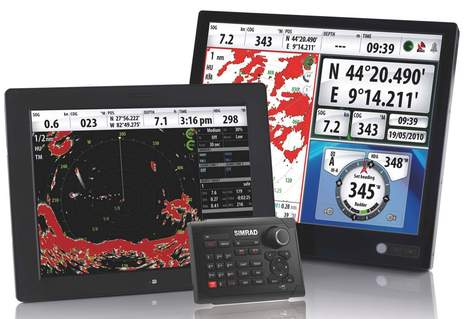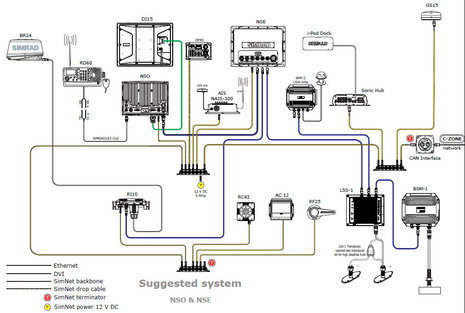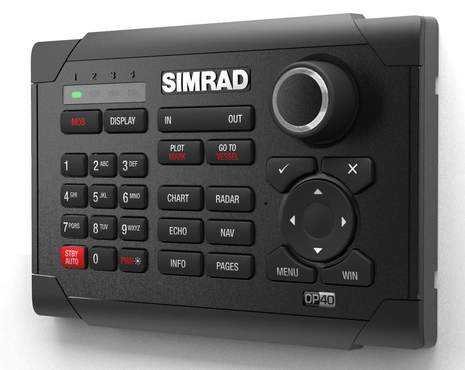Simrad NSO, the NSE series goes big

This week in Newport, and in Southhampton, Simrad introduced the NSO Navigation Series, a black box version of the NSE system, and while it's hard to imagine an MFD faster than an NSE, even the prototype NSO I fooled with yesterday seemed so. The processor box is, in fact, the same as the one used on the GB40 Glass Bridge system, only with a new 80 gig hard drive and all new software from Linux on up. There will even be an upgrade path for GB40 owners, and I suspect that will be tempting...
The NSO will support all the hardware NSE does -- like Broadband Radar and Sonar, StructureScan, HD Radar, SimNet and NMEA 2000 whatever, etc -- plus all the app-like functions Simrad added with the NSE 2.0 update -- like autopilot control, SonicHub audio, and C-Zone distributed power. A single $4,800 processor can feed up to three monitors (repeat only), and a keypad can run up to four processors. And you can mix NSE 8- and 12-inch MFDs with NSO processors, as illustrated below in one of many possible configurations.
 An NSO system can run two radars, but Simrad told me they won't recommend pairing a BR24 with a pulse radar due to the interference issues. But the pairing will work and in my experience the interference is tolerable if the scanners are mounted distant enough horizontally and/or if the Broadband is set at a close range and the magnetron further out (and they still working to improve the IR). At any rate, NSO sure looks like a smart advancement for Simrad, and possible good news for those already using NSE or GB40 systems. Here, by the way, is a closeup of the new OP40 keyboard, which mimics the NSE (except for the Display/Processor control). It runs on SimNet and a planned software update will allow it to also be used simply as a remote keypad for an NSE.
An NSO system can run two radars, but Simrad told me they won't recommend pairing a BR24 with a pulse radar due to the interference issues. But the pairing will work and in my experience the interference is tolerable if the scanners are mounted distant enough horizontally and/or if the Broadband is set at a close range and the magnetron further out (and they still working to improve the IR). At any rate, NSO sure looks like a smart advancement for Simrad, and possible good news for those already using NSE or GB40 systems. Here, by the way, is a closeup of the new OP40 keyboard, which mimics the NSE (except for the Display/Processor control). It runs on SimNet and a planned software update will allow it to also be used simply as a remote keypad for an NSE.

 Share
Share
Played with it at Southampton nice equipment but expensive compared to garmin and raymarine ( who now have nice remote keyboards two even though there marketed for the " G" series they work on E and Cwide )
Ps played with furuno rd33 I was not that impressed the screen ratio makes the. "dials" look small and compressed. The st70 is better and the star on a price performance has to by garmins gm10
Davw